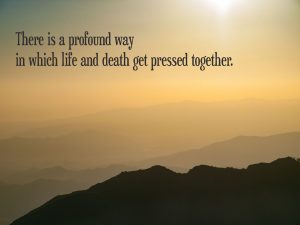I can’t help how I feel
Are you familiar with the “Feeler/Thinker Doom Loop”? It’s the conflict cycle between a person who relies too much on their emotion and a person who relies too much on their rationality.
Listen in on a doom loop between Emotianna and CogNate:
CogNate: “What’s wrong now?”
Emotianna: “Nothing.”
CogNate: “But, it’s all over your face.”
Emotianna: “Well if you must know, I was talking, and you just walked away. You always ignore me.”
CogNate: “I was not ignoring you. You had finished. There was a distinct two-second pause which denotes a period in your sentence.”
Emotianna: “I was about to cry. Not that you care, you just run!”
CogNate: “I was literally four feet away!
Emotianna: “No, you were totally away!”
CogNate: “I’ve got a tape right here; we’ll measure it”
Emotianna: “You’re being RIDICULOUS!”
CogNate “Me?! Why do you have to be SO emotional?!”
Emotianna: “I can’t help how I feel!”
Does this cycle sound familiar? It tends to get worse from there. CogNate doesn’t understand why someone would want to be so inefficiently emotional. And Emotianna doesn’t understand why someone would want to be so coldly logical. Emotianna believes that CogNate is telling her to feel less, which seems disingenuous to her. And CogNate believes Emotianna is telling him to think less, which makes no sense to him.

Both feel that they are being asked to be less than who they are. And they naturally resist the diminishment. And then they react to the threat of diminishment by relying even more on their emotionality or rationality. Doesn’t bode well for future conversations.
But what if they have it backwards? What if the solution to the doom loop isn’t reducing something, but adding something? And what if adding that something would actually enhance their capacity to feel and think?
You see, the problem with emotion and reason isn’t that they are too much, but rather that they aren’t enough on their own, we use these capacities to veer in defensiveness. The problem isn’t using your feelings or reasoning; the problem is misusing them.
When CogNate uses his reason to come up with technical arguments to defend himself he misses the point of loving (really he’s missing the point of being human). Even if CogNate gets it technically right about the four-foot distance, he gets it wrong about how to move closer. Using reasoning defensively, the “righter” he tries to be, the colder he becomes. What are the defensive uses of reason? Here’s a short list: justifying, tight lawyer-like arguments, data-shielding himself, evidence-based blame shifting, and distance through correctness. He might win an argument on technical grounds but loses Emotianna on relational grounds.
And what about Emotianna? How is she being defensive? She said, “I can’t help how I feel.” But she probably means something like, “I’m just reporting what I experience. I’m not making stuff up. I can’t change my emotions just because you don’t like them. And if you think I can, then you are telling me to be dishonest.”
But this isn’t the whole story. It may be largely true that she can’t choose which emotions percolate up through her heart and into her body. But it is also true that she has a choice about where to take the emotions once she has them. They are raw material, and she is responsible for building something good with them.
In other words, what if Emotianna can help what she feels? What if she can guide her emotions in a healthy direction? We certainly know that emotions can be steered in unhealthy, defensive directions. For example, she could take her hurt into all-or-nothing thinking and blaming (you always ignore me), manipulating (I’ll shut down and punish you), shaming (you don’t care) or even self-contempt (I am stupid to feel so much). But what are the healthy directions?
Let’s name Emotianna’s raw emotion as “hurt”. The question is: how can she use her hurt to love?
Here are a few possibilities:
- Rather than starting with accusation, she could offer the hurt to CogNate. “Listen, whether it should have or not, it hurt me when you moved away. Could you help me with that?”
- She could draw upon other true emotions: her love for CogNate, her courage to talk, her longing for good connection, her willingness to risk trust.
- She could linger in the hurt in order to learn:
- Is this hurt right-sized or is something else going on?
- Discern what she feels and wants to be able to express it more clearly and productively.
- Use her emotional gift to wonder what’s going on with CogNate.
All these possibilities are about slowing down her reaction to hurt. They are about not moving so quickly to relieve it but taking time to grieve it and then pondering how to enhance her hurt with love.
A couple of observations about adding something (love) to your emotion and reasoning:
- Adding love doesn’t guarantee that the other person will change. But it does mean that you have to. Adding love is certainly a risk and fear of that risk is why we don’t add it. So, no, love doesn’t guarantee that the other person will change, but on the other hand, fear to love, guarantees that you won’t. Trying love is our best bet at growing ourselves and possibly the relationship.
- Notice: Adding love doesn’t diminish your capacity to feel or think, but rather it enlarges it. Love uses your human gifts for what they are made for and in so doing re-attunes your heart. Emotion, in the service of love, grieves more cleanly and gives courageously. Reason, in the service of love, discerns more fairly and chooses more wisely. Love doesn’t chain your gifts; it releases them.
We may not be able to help our initial feelings and thinking, but we can help them along by adding love in the mix. In so doing, we begin to use our human gifts of heart and mind to become more like Christ.
 Roger Edwards joined The Barnabas Center in 1991. He works with both individuals and couples, helping people confess their need and embrace their available choices to lead healthier lives. Roger also teaches and leads discussion groups and retreats applying the Gospel to everyday life. He is a licensed clinical mental health counselor (LCMHC), holds a master’s degree in biblical counseling from Grace Theological Seminary in Indiana and a bachelor’s degree in engineering from the University of North Carolina at Charlotte. He is married to Jean; they have seven children and nine grandchildren.
Roger Edwards joined The Barnabas Center in 1991. He works with both individuals and couples, helping people confess their need and embrace their available choices to lead healthier lives. Roger also teaches and leads discussion groups and retreats applying the Gospel to everyday life. He is a licensed clinical mental health counselor (LCMHC), holds a master’s degree in biblical counseling from Grace Theological Seminary in Indiana and a bachelor’s degree in engineering from the University of North Carolina at Charlotte. He is married to Jean; they have seven children and nine grandchildren.




